A Tonsillectomy in Progress, Jakarta, Indonesia
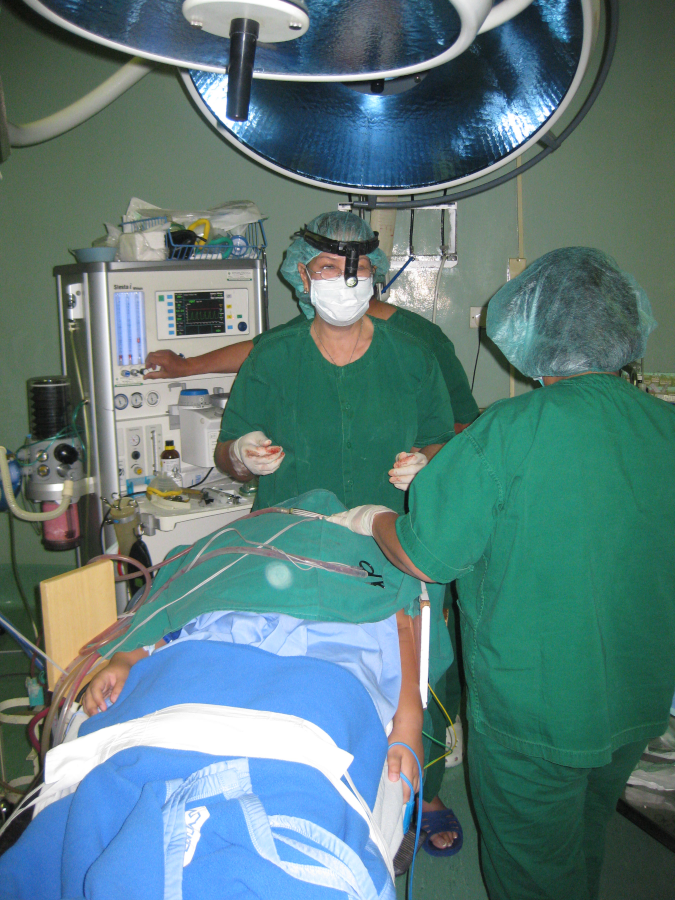
Credit: Jeromi Mikhael. CC 4.0 license
On June 20, 2022 a 27-year-old Brazilian pageant winner, Gleycy Correia, died from complications of tonsil surgery. Miss Correia had spent 77 days in a coma before her death. The coma resulted from a post-tonsillectomy hemorrhage she suffered in the first week after surgery. Her death brought into the fore a discussion about tonsillectomy risks and benefits, especially when this procedure is performed on adults. It was this news story that prompted today's blog.
I'll start my discussion with a quote from the JAMA journal, Otolaryngol Head Neck Surgery (2018) about the results of a study carried out in Denmark:
In this population-based cohort study of almost 1.2 million children, removal of adenoids or tonsils in childhood was associated with significantly increased relative risk of later respiratory, allergic, and infectious diseases. Increases in long-term absolute disease risks were considerably larger than changes in risk for the disorders these surgeries aim to treat.
Please note that the last sentence of that quote states that over a three-year period the risk of adverse events after surgery (such as throat infections and allergies) suffered by a patient were greater than the risks that patient ran (with regard to these conditions) before surgery:Increases in long-term absolute disease risks were considerably larger than changes in risk for the disorders these surgeries aim to treat
Tonsil Guillotine (Approximately Late 1800's)
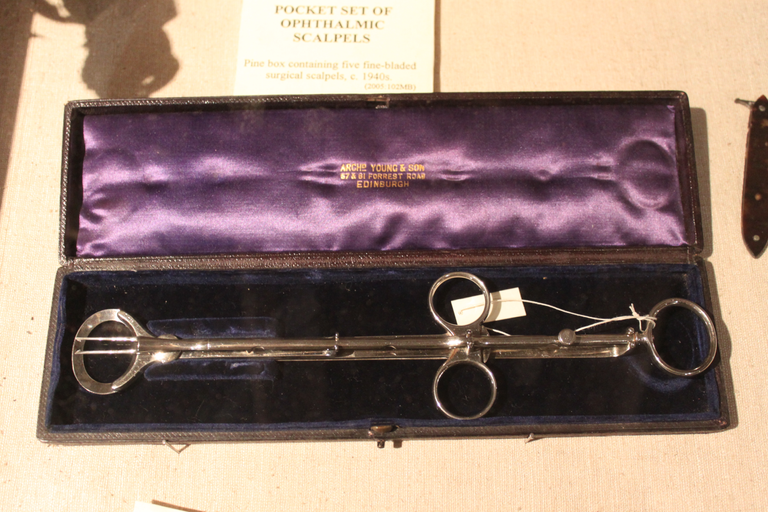
Credit: Jenny O'Donnell. Used Creative Commons Attribution-Share Alike 2.0 UK: England & Wales license. According to Science Museum Group This instrument to remove tonsils was popular in the late 1880s. Its use died down in the early 1900s because there were "high numbers of people who experienced heavy bleeding and recurrent sore throats". However, it seems the instrument is still used today by some practitioners.
Another article from the journal Otolaryngol Head Neck Surgery (published in 2015) states that Tonsillectomy is one of the most commonly performed surgical procedures in the United States. The authors of this article explain that there is 'limited data' about the safety of this operation on adults. Most studies look at pediatric outcomes. There are some statistics, though.
For example, it is estimated that the mortality rate for this procedure is 1 death for every 20,000 surgeries. However reoperation (needing to go back and correct a problem surgically) in the pediatric population is estimated to be between 0.5% and 2.1%. It seems reoperation is usually caused by hemorrhage, the most serious risk of this surgery.
Adults, however, have been found (in one study) to have a reoperation rate of 2.2% (in the U. S.).
Tonsil Artery Forceps
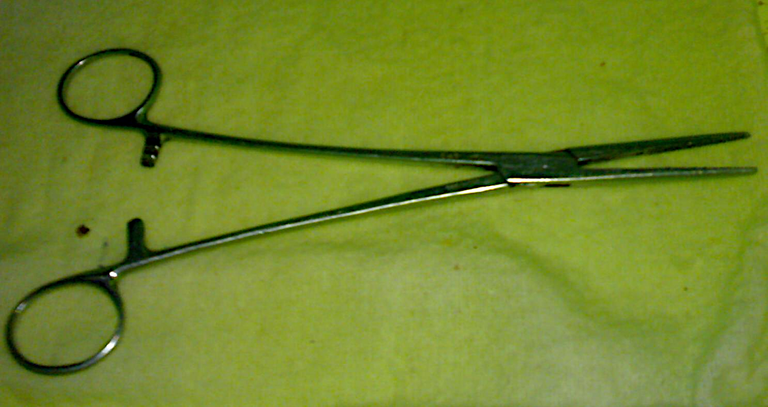
Credit: Sarindam7. Used under CC 1.2 license. According to the website Surgical Holdings, tonsil artery forceps are used "for grasping and compressing an artery to control bleeding during tonsil surgery".
A more concerning report published by Penn State University in 2014 states that Twenty percent of adults who have tonsillectomies will have a complication... In six percent of the procedures performed on adults, the complication will be post-opterative hemorrhage. This is the complication that ultimately killed Gleycy Correia.
Even more interesting perhaps, than the complication rate, is the fact that this risk-prone procedure occurs more often in some geographic areas than in others. The thrust of the Penn State study is not only to highlight the previously under-appreciated risks of tonsillectomy. The study also emphasizes the difficult position of patients contemplating surgery. Patients are supposed to make informed decisions, and yet with a dearth of data, how can they?
In the words of the study authors:
Patients expect to compare the risks and benefits of treatment options, but as our study shows, credible patient-centered information is often lacking, even for a common procedure that has been in practice for many, many years. The availability of important risk and benefit information should be expedited, and providers need to be trained to engage patients in how to use this information to make informed choices.
Boyle Davis Mouth Gag, Surgical Instrument Used in Tonsillectomy
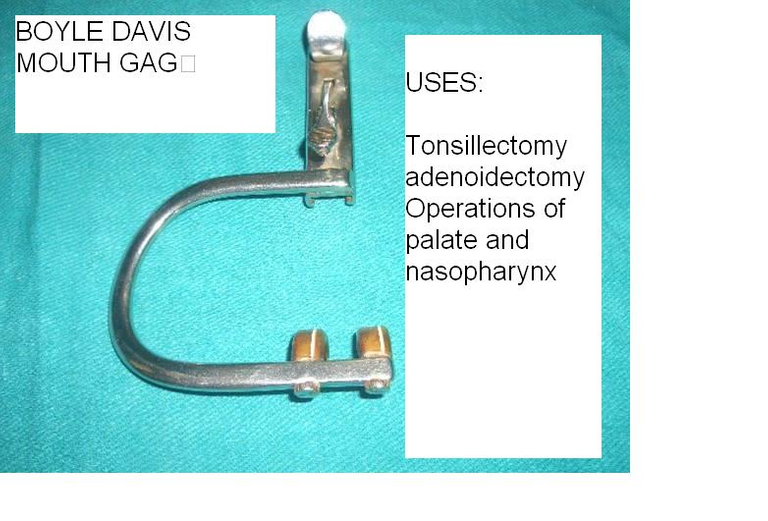
Credit: Netha Hussain. Used under CC 4.0 license Amazon marketing page for this instrument explains its use:"Mouth gags are used to keep the patient’s mouth open during oral surgery..."
The difficulty in making a decision is compounded for patients by conflicting public reports. For example, the journal Consultant 360, which characterizes the publication as a Multidisciplinary Medical Information Network stated in 2014, "Tonsillectomy is 'very safe' in adults, with low mortality and morbidity rates, a new study has found."
Consultant 360 is a journal geared toward practitioners. According to the journal's website: "Consultant and Consultant360.com pull together practical clinical advice from top experts in many specialties in convenient print and online sources for primary care practitioners."
Eves Tonsil Snare, Used in Tonsillectomy
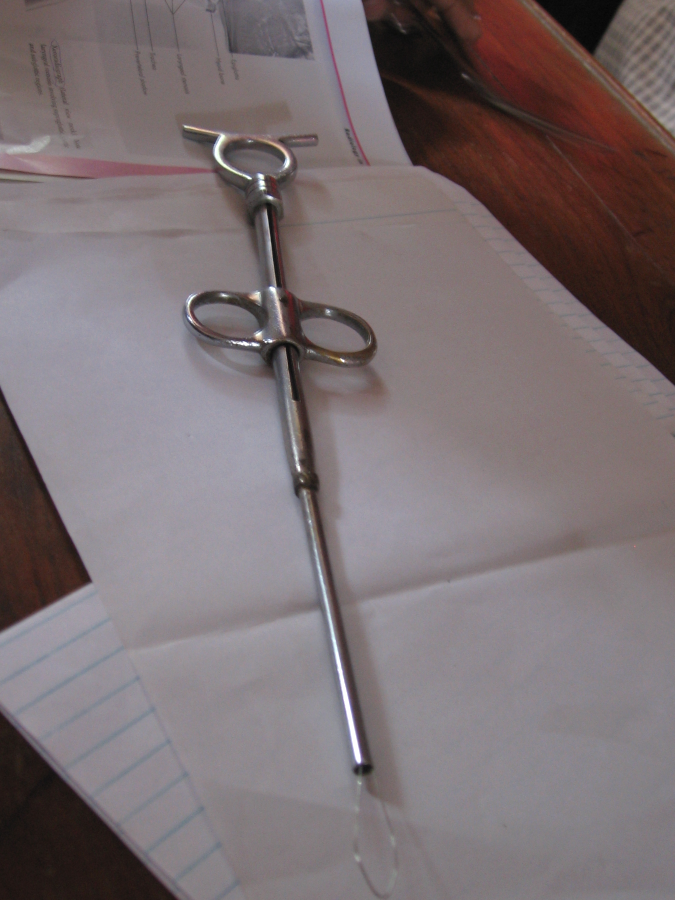
Credit: Netha Hussain. CC license 3.0 The tonsil snare is "designed to encircle the affected tonsil for removal". (as per NovoSurgical).
The most recent publication I found that addresses safety of tonsillectomy was issued by Patient Safety, an agency of Pennsylvania State Government that exists to evaluate issues of patient safety. The authors of this publication discuss variables that may affect patient outcomes, especially bleeding. The authors state:
Postoperative uncontrolled bleeding is a well-established complication...
The authors go on to describe an analysis of when this complication occurs and which groups are more likely to experience it. Their conclusions are unclear, although age seems to be a factor. The authors explain:
Our findings indicate that the post-T/A timing of uncontrolled bleeding may vary systematically as a function of patient age; however, future research is needed to better understand this topic.
Rate of Tonsillectomy Varies Around the World. Why?
Health 24, a news website in South Africa ran a headline in 2016: Why Does South Africa Have the Highest Rate of Tonsillectomies in the World? The authors conclude that the driving force behind all these tonsillectomies is money. The article quotes a surgeon, Dr Martin Young, "...the main reason might surprise many parents – financial gain for doctors".
In 2017, the International Journal of Pediatric Otorhinolaryngology looked at the different rates at which tonsillectomies were performed around the world. Their analysis yielded this conclusion:
The volume of tonsillectomy procedures is associated with a health care system's overall structure, regulation, financing, and provision methods.
The upshot of this meta-analysis of tonsillectomy rates across the world was this: The rate at which tonsillectomies were performed was associated with healthcare system structure and financing, not data related to health factors.
I have my tonsils. My husband doesn't have his. I grew up in a rural area that offered virtually no healthcare services. He grew up in New York City and had ready access to many healthcare services. Our experience seems to reflect, in microcosm, the dynamic described by Health 24 and the International Journal of Pediatric Otorhinolaryngology (above).
According to the Mayo Clinic tonsillectomies (in the U. S. I'm assuming) are less common today than they used to be. Today they are "usually performed for sleep-disordered breathing but may still be a treatment when tonsillitis occurs frequently or doesn't respond to other treatments."
When the decision is made, to operate or not, doctor and patient must weigh the potentially grave risk this procedure may present. It is hoped that in the future a more accurate assessment of that risk will be available (data) in order to help concerned parties decide.

@muelli, on LIL
Sources
1https://jamanetwork.com/journals/jamaotolaryngology/fullarticle/1814414
3https://www.consultant360.com/story/tonsillectomy-has-low-mortality-and-morbidity-adults
4https://patientsafetyj.com/index.php/patientsaf/article/view/post-tonsillectomy-bleeding
5https://pubmed.ncbi.nlm.nih.gov/35500397/
6https://www.ncbi.nlm.nih.gov/pmc/articles/PMC8296750/
7https://www.ncbi.nlm.nih.gov/pmc/articles/PMC7075105/
8https://jamanetwork.com/journals/jamaotolaryngology/fullarticle/1814414
9https://www.mayoclinic.org/tests-procedures/tonsillectomy/about/pac-20395141
11https://www.ncbi.nlm.nih.gov/pmc/articles/PMC8701389/
12https://people.com/human-interest/miss-brazil-gleycy-correia-dead-at-27-after-tonsil-surgery/
13https://www.ncbi.nlm.nih.gov/pmc/articles/PMC6145787/
16https://www.ncbi.nlm.nih.gov/books/NBK536942/
17https://www.surgicalholdings.co.uk/ent/
18https://www.amazon.com/Boyle-Davis-Tonsil-plates-blade/dp/B00VK5QFVC
19https://www.consultant360.com/story/tonsillectomy-has-low-mortality-and-morbidity-adults
20https://www.consultant360.com/about-journal
21http://novosurgical.com/eve-tonsil-snare-31147.html)
22http://novosurgical.com/general-instruments.html
23https://patientsafetyj.com/index.php/patientsaf/about
24https://patientsafetyj.com/index.php/patientsaf/article/view/post-tonsillectomy-bleeding
Most of the complications pertain to tonsils can be treated with medication, although in some troubling cases, where patient has severe breathing problems or risk of cancer, then an ENT decides whether to go for it or not.
Now, the surgery namely Tonsillectomy is known to be miner and adults may take 2 to 3 weeks to recover. But, any death associated with post-tonsillectomy complications is quite rare and might have other causes than the surgical procedure itself.
One of my cousins had that surgery, he had recovered within few weeks and now it's been 20 years since then.
Thanks for sharing something informative.
Mmmh. I didn't know such operations were so risky, and actually didn't even know that they were routine in some countries. In fact, I have never heard about them where I live.
From the information you shared in our blog, I would tend to say that we should avoid them whenever it is possible, because a risk of complications of a few % is really big (I know that complications do not necessarily mean death). At the end of the day, it is probably always a risk/benefit assessment that should drive the choice.
In any case (any!), we should proceed when driven by economical reasons (as what is going on in African countries is a disaster). This is really crazy... but I am not surprised, knowing the world in which we live.
An interesting bit of trivia I didn't include: the country with the second highest rate of tonsillectomy in the world is Northern Ireland. I don't understand it, but there we have it.
Thank you for stopping by and reading. I'm already thinking about my next Stem blog. Read about a most interesting bee. Hope it works out.
Be well, @lemouth.
Northern Ireland? Wow, that's surprising I agree. If you ever find the reason, feel free to share it...
Cheers!
Thank you for this interesting review. I lost my Tonisilla palatina around 40 years ago. It was a real traumatic procedure in local anaesthesia at home. The local anaesthesia in the first step doesn´t function very well and a reanaesthesia was necessary in order to continue the devasting destruction of my Tonsilla palatinae.
Sleeping by sitting three nights after the intervention was not easy.
Afterwards I has 3-4 years an increaed rate of respiratory infectitons. I think this was the result of the loss of immunological memory cells within the Tonsilla palatina.
From current point of view there is only one absolute indication to a tonsillectomy - the development of a parapharyngeal life threatening abcess.
The tonsils are normally all time in some kind of physiological inflammation in order to combat bacterial pathogens within the orapharynx.
So the tonsilitis is often self limiting. As I said only in the case of a parapharyngeal abscess or recurrent severe chronical tonsilitis with the risk of dissemination of streptococus and other bacteria to the valves of the heart the indication of a tonsillectomy must be discussed in interdisciplinary setting with the patient.
It is just my own opinion.
Best wishes from Germany.
!LUV
@janasilver(2/3) gave you LUV. H-E tools | my wallet | discord | community | <><
H-E tools | my wallet | discord | community | <><
HiveBuzz.me NFT for Peace
Very interesting your article, especially caught my attention because at the age of 9 years old I was operated and my tonsils were removed, the same surgery was used to scrape the adenoids, then at 13 years old I was operated to intervene surgically on the turbinates.
At that age I had very little power of decision, but I would have liked to decide not to have surgery, but I can no longer return the time, thank God that I am well, but I still do not understand today why I had those surgeries.
Greetings and thank you for your valuable contribution.
Thank you for stopping by, @carlos84. I am sorry about those (unnecessary) procedures. Fortunately you survived with what seem to be no serious consequences.
I'm guessing you must have had means and access to medical care. I was very poor. While there are many disadvantages to being poor, at least the poor receive a lot less medical care and probably get to keep their tonsils 😄 (in the U.S., anyway).
Seriously though, one has to wonder how many of these procedures would be performed if doctors and hospitals didn't make money from doing them.
I appreciate your comment and hope you have a great Sunday.
Ohh, it's sad news :S I didn't know it could be a dangerous surgery. Thanks for explaining this!
Thank you for stopping by. Yes, dangerous. Most of us don't realize how dangerous. My philosophy is to stay away from doctors as much as possible :)
Hope you have a great night!
It's been a while. Welcome back. With a bang as usual.
That seems like a typo - 'tonils', instead of 'tonsil'
Nevertheless, I don't think tonsilitis is common around here. Can't recollect anyone I know having it.
I think one of my siblings had something along that line in our younger days. She was treated with hot-pepper-soaked dry gin. Since then, nothing of such.
Thank you for the welcome. And,thanks for correcting that typo. I looked at that so many times and my eyes never picked it up.
Tonsillectomy, it seems should be rare, very rare. But apparently that is not the case in some areas of the world.
I like that, a lot :))
Ouch! I read this post laying down with my mouth open. Heh. I've never given much thought to tonsils, and given how squeamish I am about medical procedures, I don't think that I'll dig deeper into the subject. So, I'm glad it was you who brought it up, and hopefully I'll never have to hear the words, "open up and say ahh!", unless there's whip-cream involved.
Me too 😁
Thanks for stopping by, @litguru
Thanks for your contribution to the STEMsocial community. Feel free to join us on discord to get to know the rest of us!
Please consider delegating to the @stemsocial account (85% of the curation rewards are returned).
Thanks for including @stemsocial as a beneficiary, which gives you stronger support.
Thank you stemsocial, very much. Your support and endorsement are much appreciated. Yes, I do delegate :)
~~~ embed:1542561839002828801 twitter metadata:Z2VudGxlc2hhaWR8fGh0dHBzOi8vdHdpdHRlci5jb20vZ2VudGxlc2hhaWQvc3RhdHVzLzE1NDI1NjE4MzkwMDI4Mjg4MDF8 ~~~
The rewards earned on this comment will go directly to the people( @gentleshaid ) sharing the post on Twitter as long as they are registered with @poshtoken. Sign up at https://hiveposh.com.